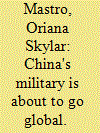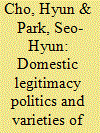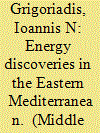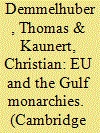|
|
|
Sort Order |
|
|
|
Items / Page
|
|
|
|
|
|
|
| Srl | Item |
| 1 |
ID:
136185


|
|
|
|
|
| Summary/Abstract |
Over the past decade, formerly close U.S.-Saudi relations have been under immense political pressure, in private and increasingly in the public media, as the two governments have dealt with the consequences of the 9/11 attacks, the 2003 Iraq War and the Arab Spring. However, there are significant U.S. interests at stake in the Middle East that require Washington to maintain at least a working relationship with Riyadh:
|
|
|
|
|
|
|
|
|
|
|
|
|
|
|
|
| 2 |
ID:
134828


|
|
|
|
|
| Summary/Abstract |
Usually when the massive plates that float over the Earth’s molten core collide, the intense pressure over millions of years pushes the land upward. It is this force that has created some of the world’s most breathtaking mountain ranges. About 80 million years ago, for some reason, when the Asian plates encountered the African and European plates this wasn’t the case. Instead of the earth lurching upwards towards the sun, the plates separated, creating the volatile Syrian East African Rift Valley: A valley that includes the world’s lowest point — the Dead Sea — 427 meters below sea level.
|
|
|
|
|
|
|
|
|
|
|
|
|
|
|
|
| 3 |
ID:
136286


|
|
|
|
|
| Summary/Abstract |
International politics has witnessed numerous ups and down, escalations and de-escalations all the way through history. The Ukraine Crisis of 2014 also appears to be one of the signposts of international political arena. The crisis which initially was supported to be a mere regional crisis, eventually opened up to a range of international diplomatic manoeuvring.
|
|
|
|
|
|
|
|
|
|
|
|
|
|
|
|
| 4 |
ID:
135941


|
|
|
|
|
| Summary/Abstract |
Energy is more than an ordinary commodity ─ it has always acquired political attributes. Access to energy resources is an important factor for the political and economic development of a country. It not only lays a solid material foundation for the economic development of a country, but also helps to increase its comprehensive national strength and enables the country to pursue an independent foreign policy and to have extensive influence in international politics. Global energy security is crucial to economic growth and people’s livelihood in all countries. Energy is also fundamental to the prosperity and security of nations. The advent of globalization, the growing gap between the rich and poor, and the need to fight global warming are all intertwined with energy concerns. There is a pressing need for strategic thinking about the energy security.
|
|
|
|
|
|
|
|
|
|
|
|
|
|
|
|
| 5 |
ID:
134759


|
|
|
|
|
| Summary/Abstract |
The rise of China has important implications for the regional order in East Asia. Such implications are not limited to material calculations, such as the size of China’s economy and its military expenditure, but also include an ideational dimension. This article examines the rise of China from the perspective of the recent development of Chinese international relations (IR) theory. Rather than being a purely academic pursuit of theoretical pluralism in the discipline, the development of IR theory in China is also a political practice seeking to address the important problem of China’s rise; that is, the threat perception of a rising power informed by rationalist IR theory. Drawing upon traditional Chinese political thought, Chinese IR scholars have engaged to debate the possibility of a benevolent power within a hierarchical international order, similar to Asia’s historic tribute system. Nevertheless, such a proposal faces limitations, at both the theoretical and practical levels, that cast doubt on the efficacy of (re)creating Asia’s future in the image of its past.
|
|
|
|
|
|
|
|
|
|
|
|
|
|
|
|
| 6 |
ID:
136702


|
|
|
|
|
| Summary/Abstract |
The burgeoning need to protect commercial assets and Chinese nationals abroad will inevitably lead Beijing to develop new military capabilities and take on missions further afield.
|
|
|
|
|
|
|
|
|
|
|
|
|
|
|
|
| 7 |
ID:
135287


|
|
|
|
|
| Summary/Abstract |
Political cosmopolitanism comes in many different shapes and sizes. Despite its intellectual diversity, cosmopolitanism typically agrees on one crucial matter: any prospective global democracy is best envisioned not in terms of a hierarchical world state, but instead as a multilayered system of global governance resting on an unprecedented dispersion of decision-making authority. In discarding traditional ideas of world government, cosmopolitans typically succumb to a series of mistakes. First, they presuppose unfairly dismissive accounts of world government. Second, they misleadingly contrast their own multilayered and (allegedly) institutionally novel vision to early modern (for example, Hobbesian) ideas of sovereignty, or to Max Weber's influential definition of the modern state. They thus obscure the fact that the modern state's diverse manifestations can only be partly grasped by ideal-types drawn from either Hobbes or Weber. Consequently, they depend on straw person accounts of the modern state. Third, envisioning their proposals as building on the familiar ideal of institutional checks and balances, they misconstrue the contribution that checks and balances can make to global-level democracy. Their hostility to statist ideas about global democracy notwithstanding, their proposals sometimes mimic core attributes of traditional statehood, and they tend inadvertently to ‘bring the state back in’ to global democracy.
|
|
|
|
|
|
|
|
|
|
|
|
|
|
|
|
| 8 |
ID:
136377


|
|
|
|
|
| Summary/Abstract |
International efforts have failed to break the longstanding deadlock in Armenian-Turkish relations. Emil Sanamyan look at the role of Azerbaijan, Russia, and the United States, and the potential impact of the imminent centenary of the Armenian genocide.
|
|
|
|
|
|
|
|
|
|
|
|
|
|
|
|
| 9 |
ID:
134719


|
|
|
|
|
| Summary/Abstract |
Flawed electoral legislation in post-Soviet states has facilitated the conduct of undemocratic elections. This article argues that the low quality of electoral legislation in the region results in large part from a process of ‘authoritarian diffusion’, whereby the election laws of the post-Soviet states extensively borrow and adapt from Soviet laws and post-communist Russian laws. The authorities of most post-Soviet states have routinely disregarded recommendations by the Organization for Security and Co-operation in Europe and the Venice Commission to improve electoral legislation. Besides presenting evidence of ‘authoritarian diffusion’ across the post-Soviet area, the article highlights the enduring impact of the Soviet legacy and of Russia's relatively hegemonic position in the region.
|
|
|
|
|
|
|
|
|
|
|
|
|
|
|
|
| 10 |
ID:
135294


|
|
|
|
|
| Summary/Abstract |
What drives East Asian regionalism? The rise of China and the perceived decline in the influence of the United States have sparked debates about the future of the regional order, including the yet-unresolved question of whose leadership is likely to be more stable and accepted as legitimate by other regional actors. What is puzzling, however, is that persistent demands for the formation of a coherent and uniquely East Asian regional institution have come not from China or the US, as is the focus of existing studies, but rather Japan and South Korea. In this article, we propose an alternative framework that conceptualises the varieties of East Asian regionalism, emphasising the multiple pivots and variegated levels of politics involved in efforts toward regional cooperation. We find that competing proposals for East Asian regionalism since the 1990s are not determined by structural pressures or the convergence of interests but rather result from domestic legitimacy politics. Japanese and Korean leaders have, at different time periods, proposed their own alternative region-making initiatives appealing to domestically contested views on how best to seek autonomy from the region's Great Powers as a way to enhance their political standing domestically and regionally.
|
|
|
|
|
|
|
|
|
|
|
|
|
|
|
|
| 11 |
ID:
136169


|
|
|
|
|
| Summary/Abstract |
A fundamental challenge in teaching international relations is the need to bridge the students' learning gap between knowledge and practice, providing them with opportunities to reflect on what they have learned and allowing them to develop a greater cognition of their own abilities in the area. The South China Sea is one of the most long-running and complex disputes in contemporary international affairs. It remains one of the few flashpoints around the globe that holds the potential to directly escalate into a great-power conflict. Understanding this issue is therefore an important task for students of IR and strategic studies, but the complexity of the dispute makes teaching it in a regular seminar/lecture format problematic. This article describes a simulation run in a masters-level class in the spring 2012 semester designed to address this pedagogical challenge. It started with a jeopardized security operation on a disputed oil platform in a real-world territory claimed by multiple states. This article explores the theoretical conception of the simulation, its structure and design, the post-simulation debriefing as well as considerations as to how the simulation might be modified to be more engaging to students and more relevant to intended learning outcomes.
|
|
|
|
|
|
|
|
|
|
|
|
|
|
|
|
| 12 |
ID:
134588


|
|
|
|
|
| Summary/Abstract |
The discovery of oil and natural-gas reserves in the Middle East at the beginning of the twentieth century changed the fate of the region. From a backwater of international politics, the Middle East became central to international strategic rivalries. Almost a century later, energy discoveries in the Eastern Mediterranean are unlikely to bring about such tectonic shifts in the strategic fortunes of the Levant. Yet they have generated a fresh interest in their potential impact on existing regional disputes and power constellations.
|
|
|
|
|
|
|
|
|
|
|
|
|
|
|
|
| 13 |
ID:
134278


|
|
|
|
|
| Summary/Abstract |
The Persian Gulf region is of strategic importance to the European Union (EU). Yet, different political realities of authoritarian government in the Gulf challenge crucial parts of EU foreign policy that are based on normative power Europe concepts. Cooperation with the ruling dynasties appears beneficial for EU decision-makers if one looks at the comprehensive agenda of common interests in the Gulf region. In 2004, the EU aimed to build a strategic partnership with the Mediterranean and the Middle East; in this the EU emphasized its commitment to advancing its partnership with the Gulf countries. Yet, from the perspective of 2012 the results are bleak. Despite some signs of improvement in deepening the political, economic and security interactions with the region, there is still no concerted EU policy in the Gulf beyond the thriving bilateral activities of some EU member states. The events of the Arab Spring have increased the challenges even further. The EU, on the one hand, is trying to support forces of liberal and democratic reform in some neighbouring countries. On the other hand, it seeks close partnerships with authoritarian family dynasties in those Gulf countries in which a democratic opening is not around the corner. This article suggests an alternative explanation for this dichotomy. While there is an inherent tension between the EU's reformist agenda and its own interests, whether security or trade interests, this article argues that much of the EU's relationship with the Gulf countries can be explained through a misperception of the specific settings of government in the region. Despite a substantial agenda of interests on both sides in areas such as trade, energy, regional security, terrorism and irregular migration, the EU's foreign policy outputs remain rather limited.
|
|
|
|
|
|
|
|
|
|
|
|
|
|
|
|
| 14 |
ID:
136462


|
|
|
|
|
| Summary/Abstract |
This article seeks to explain institutional change in international patent politics since the conclusion of the 1995 Agreement on Trade-Related Aspects of Intellectual Property Rights (trips). I argue that the distribution of interests in this issue area adheres to a sharp North–South distinction, and that the pursuit of largely incompatible and conflicting patent agendas by industrialised and developing countries, respectively, has led to the gradual emergence of an international patent regime complex. Focusing on trips-plus measures under various Free Trade Agreements, patent enforcement clubs and a range of UN organisations which have recently gained relevance for international patent politics, I show how the distribution of interests in this area has led to the development of two parallel and partially inconsistent international governance structures. I conclude that the distribution of interests explains the propensity of regime complexes towards stability and change, with institutional change being particularly pronounced when overlapping interests among revisionist actors enhance the prospects of collective action.
|
|
|
|
|
|
|
|
|
|
|
|
|
|
|
|
| 15 |
ID:
136992


|
|
|
|
|
| Summary/Abstract |
On 12 and 13 August 2014, China organized a conference titled, ‘Forum on the Development of Tibet’ in Lhasa. Out of the 100 or so participants, about 40 were international participants from about 30 countries. This article materialized out of an interest to probe a few inter-related questions such as what is the point of holding another Forum on development of Tibet when the ‘Tibet work forums’ are already doing that since 1980? Why are there international participants in it? What is the significance of the Forum in the Chinese government’s overall approach to the Tibet question? Interestingly, the conference did not have a dedicated website or it’s like where one could access information about it. On its conclusion, a document ‘Lhasa Consensus’ was brought out, which failed to provide any sense of the conference’s proceedings. Instead, it emphasized Chinese achievements in Tibet and denounced the Dalai Lama and international media for being biased. Outside China, the Forum attracted attention less for its stated agenda but more for its possible objectives. In effect, the organisers lost an opportunity to chart a new discourse on Tibet’s development sans politics. The Forum ultimately seems to be part of Beijing’s attempt at gaining lost ground on international propaganda on Tibet.
|
|
|
|
|
|
|
|
|
|
|
|
|
|
|
|
| 16 |
ID:
136628


|
|
|
|
|
| Summary/Abstract |
Germany is Weltmeister,” or world champion, wrote Roger Cohen in his July 2014 New York Times column1—and he meant much more than just the immediate euphoria following Germany's first soccer world championship since the summer of unification in 1990. Fifteen years earlier, in the summer of 1999, the Economist magazine's title story depicted Germany as the “Sick Man of the Euro.”2 Analysis after analysis piled onto the pessimism: supposedly sclerotic, its machines were of high quality but too expensive to sell in a world of multiplying competitors and low-wage manufacturing. Germany seemed a hopeless case, a country stuck in the 20th century with a blocked society that had not adapted to the new world of the 21st century, or worse, a society that was not even adaptable. Things since then have changed significantly. In the summer of 2013, more than a year before the triumph in Rio de Janeiro, the Economist reversed its own verdict—Germany now appeared on the front page as “Europe's Reluctant Hegemon.”3 In 2014, Germany came out on top for the second year in a row in the BBC's annual country rating poll as the country with “the most positive influence on the world.”4 Simon Anholt's annual “Nation Brand Index” also put Germany in the top spot in 2014.
|
|
|
|
|
|
|
|
|
|
|
|
|
|
|
|
| 17 |
ID:
135222


|
|
|
|
|
| Summary/Abstract |
This year, the tragedies and outrages of the Ukraine crisis have dominated headlines and thinking about Western relations with Russia. There can be little doubt that the United States and its European allies and partners need a response to the Russian annexation of Crimea, to the destabilization of eastern Ukraine, to the separatists’ downing of a civilian airliner—and to the threat to global order that all of these actions
represent.
|
|
|
|
|
|
|
|
|
|
|
|
|
|
|
|
| 18 |
ID:
134272


|
|
|
|
|
| Summary/Abstract |
Recently, increasing references are made to the international community that is conceptually and analytically useful when distinguished from the international society. Supposedly, the relations of some international agents can be described as a community due to their shared we-feeling, identity or ethos. This article discusses ‘thick’ and ‘thin’ international communities and suggests additional criteria that ought to be considered when determining whether a particular actor or agent is or is not a member of the international community. Moreover, the article suggests a dynamic conception of the international community as a context-dependent configuration rather than as some relatively stable subgroup of the international society. In this sense, this article offers an innovative perspective to collectivities through a focus on the international community. On a different level, this opportunity is used to draw attention to the roles beliefs play in and in the study of international politics.
|
|
|
|
|
|
|
|
|
|
|
|
|
|
|
|
| 19 |
ID:
134604


|
|
|
|
|
| Summary/Abstract |
This article examines political exile as a particular form of migration, with reference to Indonesians living in the Union of Soviet Socialist Republics (USSR) when the military regime came to power in their homeland. With the rise in Jakarta of the New Order under Major-General Suharto after 1 October 1965, thousands of Indonesians in socialist and communist states abroad were effectively isolated. Faced with detention or execution if they returned home, Indonesian leftists and other dissidents who were scattered across some dozen states spanning the Sino-Soviet divide became unwilling exiles. Several thousand Indonesians were then studying in the USSR, where they were one of the largest foreign nationalities in Soviet universities and military academies. Many spent nearly half a century as exiles, struggling to survive first the vicissitudes of the cold war and then the global transformations that came with the dissolution of the USSR in December 1991. The most influential grouping of Indonesians who remained in the USSR after 1965 was known as the Overseas Committee of the Indonesian Communist Party. In China, a separate party leadership emerged, known as the Delegation of the Indonesian Communist Party. Mirroring Sino-Soviet rivalries, the Delegation urged Indonesian leftists in the USSR to join them in China. Hundreds did so. These rival factions were separated by mutual distrust until they each disbanded toward the close of the cold war. This article analyzes the changing fate of Indonesians caught in the contradictory relationship between New Order Indonesia and the USSR and in the tensions between the USSR and China as these unwilling exiles were buffeted by geopolitical transformations well beyond their influence.
|
|
|
|
|
|
|
|
|
|
|
|
|
|
|
|
| 20 |
ID:
136639


|
|
|
|
|
| Summary/Abstract |
Can great powers reach confident conclusions about the intentions of their peers? Many scholars argue that they can. One set of arguments holds that states can deduce others’ current intentions from certain domestic characteristics such as their foreign policy goals, ideology, or regime type. Another focuses on behavior and maintains that states can infer current intentions by examining their counterparts’ arms policies, membership in international institutions, or past actions in the security realm. A final set of arguments explains why intentions are unlikely to change and thus why current designs are good predictors of future plans. On careful review, these optimistic claims are unpersuasive. Great powers cannot confidently assess the current intentions of others based on the latter's domestic characteristics or behavior, and they are even less sure when it comes to estimating their peers’ future intentions. These findings have important implications for theory and policy. Theoretically, they strengthen structural realism against competing approaches. As for the real world, they suggest that the United States and China are on a collision course if the latter continues to rise and becomes a peer competitor.
|
|
|
|
|
|
|
|
|
|
|
|
|
|
|
|
|
|
|
|
|